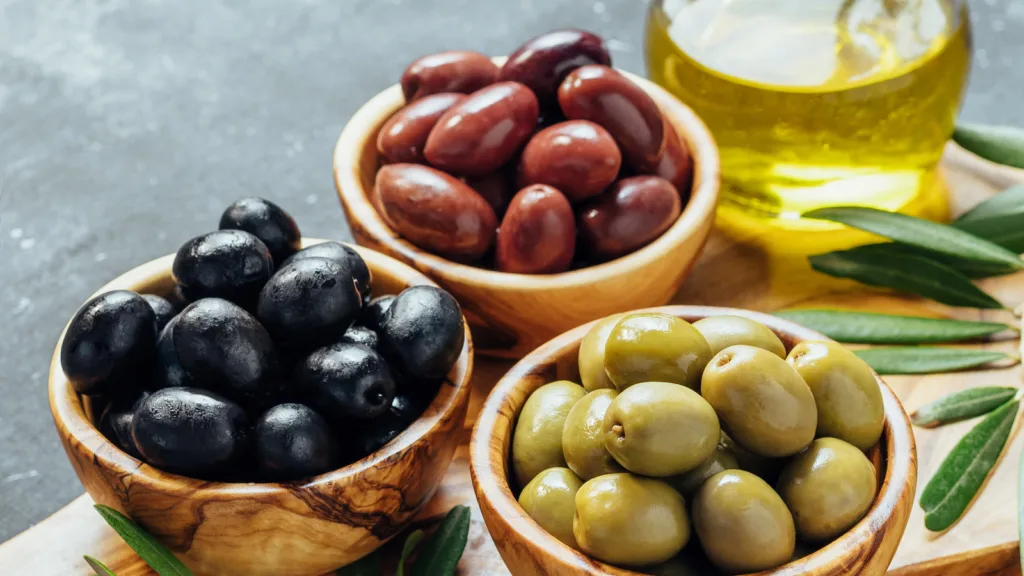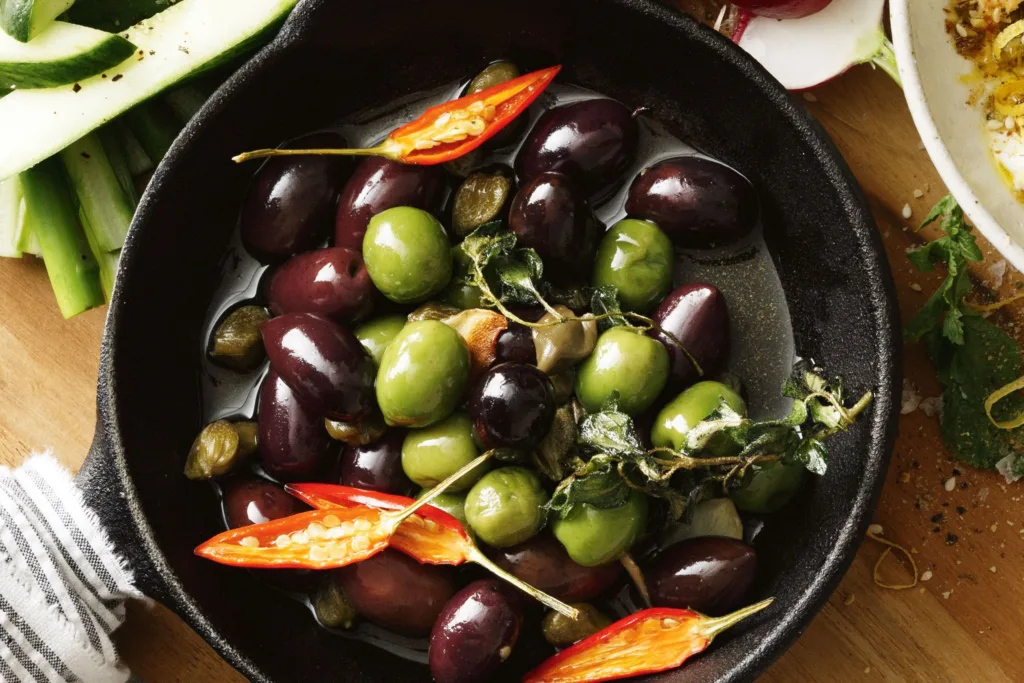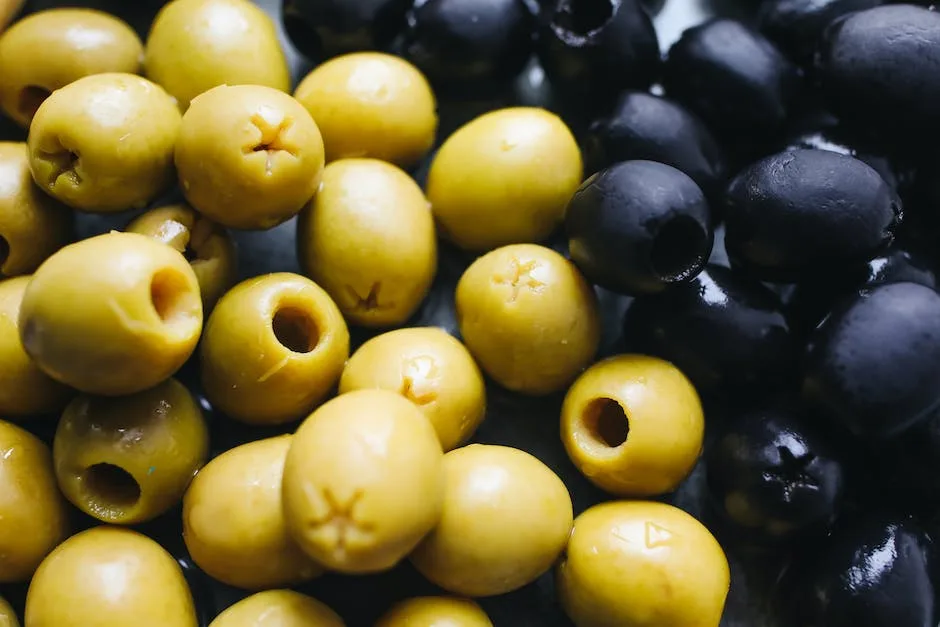The Mediterranean diet has become synonymous with health and longevity. This ancestral eating pattern, modeled after the traditional cuisines of Greece, Italy, and other Mediterranean countries, has been extensively studied for its wide-ranging benefits. One of the diet’s staple foods that is closely linked to its health-boosting powers is the humble olive. Loaded with healthy fats, antioxidants, and other powerful nutrients, olives offer a multitude of benefits that can aid weight loss efforts. Read on to learn all about the nutritional virtues of olives and their stellar role in facilitating weight loss and optimal health.

Introduction
The Mediterranean diet has garnered tremendous popularity over the last few decades for its associations with numerous health benefits. This plant-based eating pattern emphasizes whole, minimally processed foods like fruits, vegetables, legumes, nuts, seeds, and whole grains. It also utilizes healthy fats like olive oil, while limiting red meat and saturated fats. The diet has been linked to lower risks for heart disease, diabetes, cancer, and even neurodegenerative diseases like Alzheimer’s. Additionally, multiple studies have found the Mediterranean diet to be highly effective for encouraging weight loss.
One of the most characteristic components of the Mediterranean diet is the olive. Hailing from the olive tree, olives have remained a dietary staple in Mediterranean regions for thousands of years. They add a burst of flavor and nutrition to everything from appetizers and main courses to side dishes and desserts. Beyond taste, olives bring an impressive repertoire of health and weight loss benefits. They are an integral part of what makes the Mediterranean diet so incredibly healthy.
The Nutritional Powerhouse
Olives shine as a nutritional powerhouse, packing immense amounts of antioxidants along with healthy fats. Just one tablespoon of olives supplies 10% of the daily recommended value for vitamin E and 6% for iron. They also provide essential phytonutrients like phenolic compounds that act as antioxidants in the body. The predominant monounsaturated fatty acid in olives is oleic acid, the same heart-healthy fat found in olive oil. Compared to other high-fat foods, olives are low in calories. One serving of 10-12 olives contains only around 40 calories, lending them nutritional density.
Unlike dangerous trans and saturated fats, the monounsaturated and polyunsaturated fats found in olives may help reduce inflammation. Chronic inflammation has been linked to everything from heart disease and arthritis to obesity. The anti-inflammatory properties of olives make them a smart addition to any health or weight loss plan. Additionally, the rich antioxidant content of olives makes them extraordinarily beneficial. Antioxidants protect against oxidative stress, cell damage, and chronic disease by acting against free radicals in the body. By providing both healthy fats and disease-fighting antioxidants, olives offer a one-two punch when it comes to nutrition.
The Mediterranean Connection
So how exactly did olives become a nutritional celebrity in the Mediterranean region? Olive trees have flourished in the Mediterranean climate for millennia. Over time, olives became integrated into the local cuisine and lifestyles. Traditional Mediterranean diets center around unprocessed plant foods and emphasize fruits, vegetables, nuts, legumes, herbs and spices. Meals are well-balanced, nutritionally dense and full of flavor. Olive oil serves as the principal fat used for cooking and dressing foods. Olives, olive oil, herbs, nuts and whole grains are dietary foundations that bring immense nutritional value.
By following a traditional Mediterranean diet rich in plant foods like olives, people benefit from increased intake of fiber, antioxidants, unsaturated fats and an array of anti-inflammatory phytochemicals. This phytonutrient-dense eating pattern is behind the reduced risks for chronic diseases and heightened longevity associated with the Mediterranean diet. As a minimally processed whole food, olives fit seamlessly into the Mediterranean diet’s health-boosting framework.

The Role of Olives in Weight Loss
In addition to reducing inflammation and oxidative stress, olives provide particular benefits that make them helpful for losing weight. Here are some of the evidence-backed ways that incorporating olives into your diet can support weight loss efforts:
- Increasing satiety – Foods that are high in fat or fiber tend to increase feelings of fullness and satiety. Olives deliver a dose of fat and fiber in each serving, making them more satiating than low-fat foods. This means adding olives to meals or recipes can result in a lower overall calorie intake.
- Controlling cravings – Olives are packed with taste, texture, and flavor. Their savory, salty qualities make them perfect for curbing cravings for salty, crunchy foods like chips and crackers. Olives’ richness and flavor profile help combat the urge to snack on empty calories.
- Slowing digestion – The monounsaturated fatty acids, fiber and polyphenols in olives may help slow digestion of carbohydrates and reduce blood sugar spikes after eating that can lead to hunger and cravings. Their fat and fiber content promotes stable blood sugar.
- Providing healthy fats – Rather than deriving calories from refined carbs or sugars, olives offer energy from healthy fats that stabilize blood sugar. This leads to increased satiety, fewer cravings, and moderated calorie intake.
- Displacing high-calorie foods – Olives are a smart substitute for high-fat, energy-dense ingredients like cheese, fatty dressings, bacon, etc. Swapping in olives reduces calories without sacrificing taste, texture or satisfaction.
- Supporting Mediterranean diet adherence – Since olives are a hallmark food in the Mediterranean diet, eating them frequently may make it easier to follow this proven healthy and weight loss-friendly diet.
Clearly, the unique nutritional profile of olives makes them a secret weapon when it comes to losing weight and optimizing health.
The Health Benefits of Olives
Besides promoting weight loss, olives confer a spectrum of health and disease-fighting benefits. Here is a closer look at some of the top health perks associated with olives:
- Heart health – The monounsaturated fatty acids in olives help reduce blood pressure and decrease LDL cholesterol while raising HDL cholesterol. This improves heart health and reduces the risk for heart attacks, stroke and atherosclerosis. The antioxidants in olives also support heart health.
- Cancer prevention – Olives contain hydroxytyrosol, oleuropein and other antioxidant and anti-inflammatory compounds that may prevent cancer initiation and tumor growth. Studies indicate olives may help protect against cancers of the breast, colon, skin, ovaries, stomach, prostate and lungs.
- Diabetes management – The healthy fats in olives help regulate blood sugar, which aids glycemic control. Some early research suggests olives may even help preserve insulin-producing beta cells in the pancreas.
- Anti-inflammatory effects – Chronic inflammation is at the root of many modern diseases. The abundance of antioxidants in olives battle inflammation by reducing free radical damage and oxidative stress.
- Digestive health – via their fiber content, olives promote regularity and digestive health. Olives’ anti-inflammatory powers may also help soothe inflammatory bowel disorders.
- Brain health – Olives are rich in vitamin E and other antioxidants that combat oxidative damage to brain cells. This may lower the risk for cognitive decline, dementia, and Alzheimer’s disease.
- Bone health – Nutrients like calcium, iron, copper, and vitamin A in olives help maintain bone mineral density and reduce the risk of osteoporosis.
- Nutrient absorption – The healthy fats in olives aid absorption of fat-soluble vitamins like A, D, E and K. This helps put the many nutrients in vegetables and other plant foods to optimal use.
- Eye health – Olives provide phytonutrients like lutein and zeaxanthin that protect the eyes from sun damage and macular degeneration. Vitamin A is also crucial for eye health.
The diverse blend of antioxidant phytonutrients, vitamins, minerals and healthy fats make olives a nutritional superfood that delivers science-backed health benefits.

Incorporating Olives into Your Diet
Now that you understand the many merits of olives, you may be wondering how to integrate them into your diet. One of the simplest ways to start is by snacking on olives right out of the jar. Keep some at your desk, in your pantry, or packed in lunches for an easy, nutritious snack. Olives also make a perfect pre-dinner appetizer. Beyond snacking, here are some easy ways to work olives into meals:
- Add chopped olives to salads, grains, pasta or pizza as a topping
- Mix olives into tuna or chicken salad for a pop of flavor
- Sprinkle sliced olives onto tacos, fajitas or enchiladas
- Pair olives with cheeses and nuts on an appetizer board
- Toss olives into omelets, frittatas or egg scrambles
- Skewer olives alongside other veggies, fruits and cheeses
- Use olive tapenade as a sandwich spread or dip for vegetables
- Blend olives into dips, dressings, sauces, pesto or tapenades
- Stuff olives with fillings like almonds, blue cheese or fresh herbs
- Work olives into Mediterranean recipes like rice pilaf, couscous or kebabs
Some delicious, olive-centric recipes to try include olive tapenade bruschetta, olive and goat cheese stuffed chicken, meatballs with olives and tomatoes, olive caprese salad skewers, olive oil cake with an olive garnish, and dirty martinis. With so many possibilities, olives can easily become a regular part of your healthy diet.
Olives and Weight Loss: Debunking Myths
Given their high fat content, some people wrongly assume olives must be fattening. However, science disproves several persistent myths about olives and weight loss. Here’s the real truth:
Myth: Olives are high in calories and will lead to weight gain.
Fact: 10-12 olives contain only around 40 calories. Their water and fiber content offset the calories from fat.
Myth: Olives are full of artery-clogging saturated fat.
Fact: Olives contain mainly monounsaturated and polyunsaturated fats which reduce inflammation and protect heart health.
Myth: Olives have too much sodium to be part of a healthy diet.
Fact: Although olives contain sodium it is far less than in many salty snacks. Focus on low-sodium varieties if concerned.
Myth: Olives are highly processed junk food.
Fact: Plain whole olives are not processed, just simply cured. No preservatives or additives are added.
Myth: Olives raise the risk for obesity, diabetes and metabolic syndrome.
Fact: Studies actually show olives improve biomarkers for these conditions.
Myth: Eating olives leads to weight gain around the middle.
Fact: Olives may actually reduce abdominal fat accumulation due to their healthy fats.
The notion that olives are unhealthy or promote weight gain is not grounded in science. In fact, olives are linked to decreased abdominal obesity and waist circumference. So enjoy these flavorful fruits guilt-free!

Conclusion
From their extensive history in the Mediterranean region to their dense nutrient profile, olives offer so much more than flavor. The monounsaturated fats, antioxidants and anti-inflammatory compounds in olives provide science-backed benefits for health and weight regulation. Olives’ satiating effects aid weight loss by reducing overall calorie intake and controlling hunger and cravings. Their nutritional virtues make them a staple of the famously healthy Mediterranean diet.
Yet you don’t have to adhere rigidly to the Mediterranean diet to reap olives’ advantages. Simply incorporating olives into meals, snacks and recipes more regularly can help facilitate weight loss, boost heart health, and reduce inflammation. With minimal effort, olives can become a dietary MVP that makes attaining your health and wellness goals more pleasurable.
Thanks for reading! Please subscribe to our free newsletter to get new insights on nutrition, delicious recipes, weight loss tips, natural health, and more delivered to your inbox each week. And don’t hesitate to explore other posts on our blog for science-backed guidance on following a nutritious real food diet.
Thank you for reading this post, don't forget to subscribe to our free newsletter
!